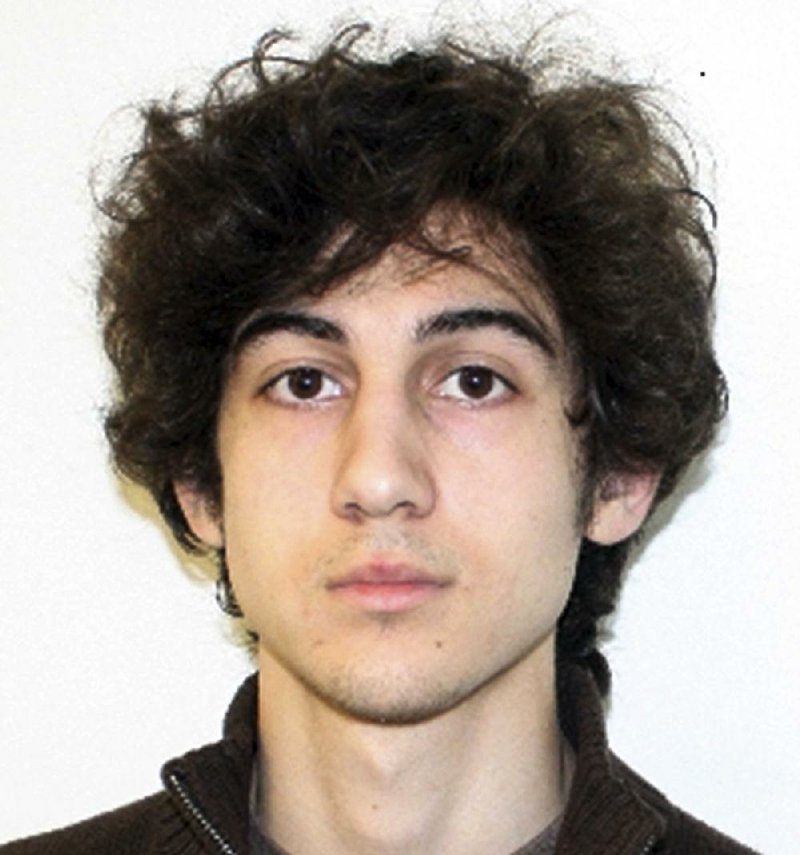BOSTON -- The government opened the sentencing phase of the Boston Marathon bombing trial Tuesday by revealing a picture of Dzhokhar Tsarnaev in his holding cell three months after the bombing, in which he is seen showing his middle finger to a surveillance camera.
Gasps went up in the courtroom and in the media overflow rooms as Nadine Pellegrini, a government prosecutor, showed the image to the jury that will decide whether Tsarnaev is sentenced to death or to life in prison without parole.
At the time of the photo, Tsarnaev, then 19, knew he was being charged with the bombings, which killed three people and injured more than 260 others. He was no longer under the sway of his brother, who was dead, Pellegrini said.
"He had one more message to send," she said, as she removed a poster board, unveiling the enlarged picture of Tsarnaev.
"This is Dzhokhar Tsarnaev, unconcerned, unrepentant and unchanged," Pellegrini said. "Without remorse, he remains untouched by the grief and the loss he caused, and he remains the unrepentant killer."
The government is asking the jury to sentence him to death, which would require a unanimous decision.
On April 8, the jury found Tsarnaev guilty on all 30 charges against him in connection with the 2013 bombings. The same jurors are now settling in for the sentencing phase, which will unfold like a regular trial. Judge George O'Toole Jr. of U.S. District Court, who is presiding, has said it could take about four weeks.
The first phase of the trial, which lasted a month, was a foregone conclusion once Tsarnaev's lawyers admitted he was involved in the bombings and all but told the jury to find him guilty. But the penalty phase that started Tuesday likely will be more contentious, with Tsarnaev's life on the line at a time when the debate over the death penalty is intensifying.
The prosecution's depiction of Tsarnaev as a man acting on his own was meant to fortify the jury against the picture the defense presented during the first phase of the trial of an adolescent from a dysfunctional family who was under the influence of his controlling older brother.
Millions of people come from dysfunctional families, Pellegrini said, but they do not cross the lines that Tsarnaev crossed.
"The lines he was willing to cross make him fundamentally different," she told the jury. And his personal characteristics, she said, "are what set him apart, and it's his character that makes the death penalty appropriate and just."
His character has been something of a black box so far, with little indication of his thoughts since his arrest. He has appeared at the trial every day, appearing disengaged and revealing nothing. That made the picture shown Tuesday all the more shocking to the courtroom.
"His destiny was determined by him," Pellegrini said during her half-hour opening statement, and he became "America's worst nightmare" as he "twisted the marathon into something cruel and ugly for his own purposes."
The defense team opted not to deliver an opening statement Tuesday and is preparing to do so when it puts on its case next week.
Prosecutors are arguing for death even as some of the survivors and the families of victims who died have asked that Tsarnaev's life be spared.
A few days ago, the parents of Martin Richard, the 8-year-old boy killed at the marathon, asked the government to take the death penalty off the table because it would mean endless appeals and would delay their ability to move on.
Jessica Kensky and Patrick Downes, a newly married couple who both lost legs during the 2013 bombings, made a recent statement, saying: "We must overcome the impulse for vengeance." And the sister of a police officer whom Tsarnaev killed has said she thought the death penalty would bring neither peace nor justice.
Calls by survivors or victims' families for the death penalty, however, have been more muted. Among those who feel strongly is Liz Norden. Two of her sons lost a leg in the blasts. She has said that because he destroyed so many lives, Tsarnaev deserves "the ultimate justice."
These expressions have presumably not reached the ears of the jurors, who have been ordered to avoid all media coverage of the case and were even told not to attend this year's marathon Monday.
The debate is particularly intense because Massachusetts abolished the death penalty in 1984, but this is a federal case and so federal law applies.
A Section on 04/22/2015

